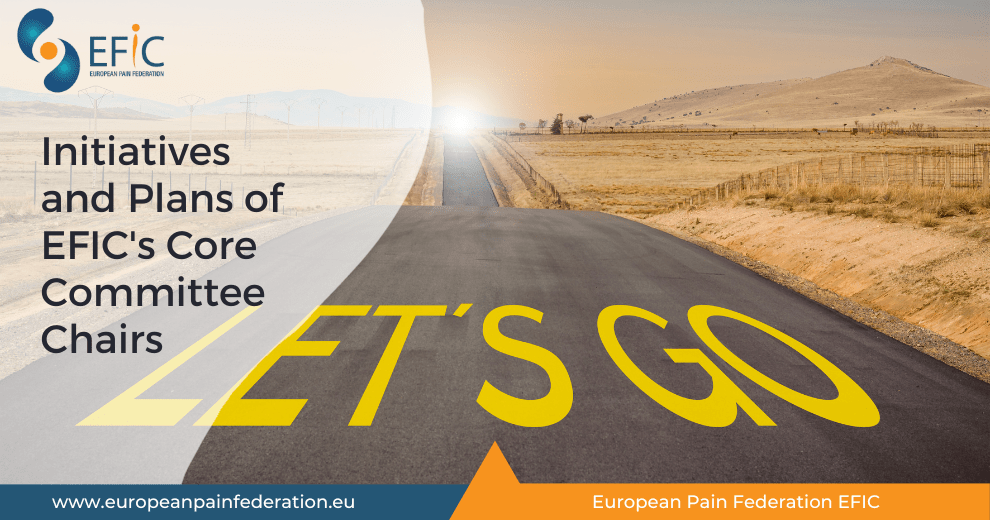Find out more from our Core Committee Chairs on their strategic focus and objectives for 2024 and beyond. Esther Pogatzki-Zahn, Indre Bileviciute-Ljungar, and Patrice Forget each bring a wealth of experience and expertise to their respective roles. Their insights provide a comprehensive overview of EFIC’s key areas of research, education, and advocacy as well as more insight into the practical goals and initiatives that will define EFIC’s trajectory in the coming years.
Esther Pogatzki-Zahn, Chair, Research
“I am an anesthesiologist specializing in pain management with 25 years of experience in the field. Additionally, I teach pain medicine and lead a group dedicated to pain research. To gain research expertise, I spent five years in the U.S., working in two laboratories that studied pain at a basic science level. However, upon returning to Germany, my primary goal has always been to connect scientific knowledge with the practical needs of patients dealing with pain, a concept now known as translational pain research. This involves bridging the gap between high-level research and pain management on the ground.
For me, translational pain research also includes understanding pain from all angles—how it affects the body, mind, and social life—and working on ways to prevent pain from becoming chronic, tailoring treatments to each person’s unique situation. My association with EFIC has a long history. I attended my first EFIC congress in Prague in 2003. Twenty years later, I took charge of organizing the 13th EFIC congress in Budapest in 2023, and I am currently leading the research committee of EFIC for the coming years.
My goal for the near future with EFIC is to foster research on what patients truly need, considering all the different aspects of pain. I envision a research agenda that not only meets but anticipates the needs of patients, embracing every facet of pain. Success in this endeavor can only be achieved if we all stand and work together—patients, researchers from various disciplines, and healthcare professionals. The aim I and EFIC have is to encourage European countries to cooperate in pain research, making this field more visible across the continent. We will initiate enriching dialogues between scientists, clinicians, and patients and support the next generation of scientists, professionals involved in pain management, and educators.
By spreading a robust research agenda across Europe, fostering activities to enrich discussions and dialogues, increasing education, supporting young scientists, and building a vibrant community of pain research enthusiasts, we are on a mission to transform European pain research and, as a major goal, advance pain management in Europe and worldwide.”
Indre Bileviciute-Ljungar, Chair, Education
“Thirty years ago, I became involved in pain education, starting from basic pain physiology and progressing to clinical disciplines. Throughout these years, I have met numerous enthusiastic individuals, both educators and researchers, dedicated to the field of pain. Despite the prevalence of chronic pain affecting many people in Europe, pain medicine as a distinct specialty is not always included in medical postgraduate education. This discrepancy may be linked to variations in access to pain services among EFIC’s countries.
As the chair of EFIC’s educational committee, I intend to persist in our efforts to formalise the concept of pain medicine as a specialty across European countries. One strategy to achieve this goal is to seek recognition for European exams in pain medicine, pain psychology, nursing, and physiotherapy.
Presently, chronic pain is managed by patients with support from appropriate multidisciplinary interventions. As an associated professor in physical and rehabilitation medicine, I have experience collaborating with individuals from various clinical disciplines and professions. This interdisciplinary and multidisciplinary collaboration needs to be robust.
EFIC’s educational role, encompassing the Academy, Educational Platform, and Pain Schools, thrives thanks to many dedicated colleagues who are active as researchers, educators, and clinicians. Therefore, EFIC will continue to provide high-quality postgraduate pain education through various educational activities recognized by UEMS (The European Union of Medical Specialists) and other professional associations.”
Patrice Forget, Chair, Advocacy and Liaison
“”Every day is a school day…” This may seem like a simple statement, but to me, it implies that the truth emanates from the patients. I work as a Professor of Anaesthesia and Pain Medicine in Aberdeen, UK. I gained valuable knowledge during medical school and in my initial years of practice in Belgium. I have attended numerous pain congresses (the first being the EFIC congress in 2006 in Istanbul), developed a solid background in pain research, led committees and expert groups, and published over 200 scientific articles. But is this the truth? The goal is to get closer to it, to try to capture it, even if, in the end, only the experience of people who live with pain represents the truth.
That being said, advocacy is not only an essential aspect to raise awareness of pain among policymakers and the public but also to ensure the involvement of patients in research. This involves giving them a place as partners in scientific research projects, even in a significant capacity. This is obviously true in the field of education as well.
Overall, advocacy is, for me, not just a committee at EFIC; it is also a real dynamic force that can make the voice of patients better heard, thereby making all our projects more legitimate.”
